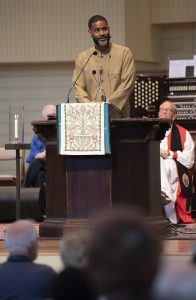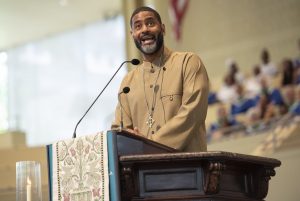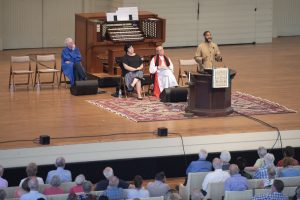
“Neighbor, oh neighbor, I want you to know you were built for this,” said the Rev. Otis Moss III at the 9:15 a.m. Friday Ecumenical Service. His sermon title was “You Are Built for This,” and the Scripture text was Daniel 3:16-18.
“You are more powerful than you will ever know,” Moss told the congregation. “With all you have experienced, lesser beings would have crumbled.”
When Shadrach, Meshach and Abednego faced King Nebuchadnezzar, they told him they would not bow down to his golden idol, whether or not God saved them from the fiery furnace.
“They told the king they would not serve his goals, follow his principles or ingest his values,” Moss said.
Moss told the story of how powerful the spirit of God can be. In 1862, the enslaved African Robert Smalls, his wife Hannah, his son Robert Jr., daughters Elizabeth and Clara and the families of the enslaved men working on the Confederate ship Planter, decide to do the impossible and escape Charleston, South Carolina.
“Remembering the words ‘And before I’d be a slave, I will be buried in my grave, And go home to my Lord, and be free,’ they decided to steal the war ship and sail it to freedom,” Moss said. “Smalls stood as a man of principle and decided to fight through the antebellum belief that those who had been kissed by the sun were spiritually devoid and intellectually wanting. This great heist pushed past every lie.”
Moss continued: “When you realize that God is love and that you are created in his image, it does something to your soul and you are moved internally. Smalls said to himself, ‘I am built for this, to defy expectations. I must be more than three-fifths of a person, I must be so powerful they have to use a whip to keep me down.’ ”
Racism is stupid and ignorant, Moss said.
“In Charleston, their racism was so stupid, they had enslaved Africans running everything on the ships,” Moss said. “The Africans knew the secret codes, how to navigate the ships; they memorized what needed to be done.”
One night when the white sailors on the ship left to go into town, leaving the Africans to clean up, Smalls decided it was time to leave. It was dangerous, but the slaves knew the codes with the appropriate signs; they put the person with the lightest complexion on the bow to give the signals.
They made it past the harbor master and past Fort Sumter.

“The dangerous moment came when they met the Union blockade,” Moss said.
They slowed down and ran up a white sheet as a sign of surrender.
“Fog rolled in,” Moss said. The ship USS Onward was getting ready to sink the Planter when the fog broke and the white flag became visible.
The captain of the Onward told them to “hold and be ready to be boarded.” When the crew of the Onward came aboard the Planter, they went looking for the white sailors they thought were sailing the ship.
Robert Smalls stepped up and said, “I give you this ship as a gift to Abraham Lincoln.”
Smalls became a captain in the Union Army, moved back to South Carolina after the war and became a businessman, publisher and politician.
“He bought the plantation where he had been a slave and allowed the widow to live on the plantation, not in the big house but a small house out back,” Moss said. “He also founded four schools for the formerly enslaved Africans. If Smalls could recognize himself as a child of God, who are we to hang our heads in despair? We have to unleash the power in our souls and the word of God is a key component. The story of Daniel reminds me of Smalls.”
The King of Babylon, Nebuchadnezzar, wanted the Talented Tenth of Israel to work for him, cutting his lawn and tending to his children. He brought Daniel, Hananiah, Mishael and Azariah from the tribe of Judah to live in Babylon.
The king changed their names to Belteshazzar, Shadrach, Meschach and Abednego.
“You know you are living in exile when those in power change your name,” Moss said. “If they called you by your real name, they would have to recognize your humanity.”
The king issued an executive order that everyone should bow down to a god he created, “a public, phallic symbol of his deep insecurity,” Moss said.
“The material is what the market deems valuable; it celebrates gold and silver, but money does not make a moral compass,” he said. “You have to have strong roots when you are tempted by the king. Meschach, Shadrach and Abednego would not bow down to a king who sought to bolster his own image and his polls. You have to be careful what you conform to.”
The king had unchecked power, and no one could tell him he was wrong.
“There was no one to say ‘the Emperor has no clothes,’ ” Moss said. “He really thought he was the be-all and end-all.”
Nebuchadnezzar threatened the Israelites with death if they did not bow down. They replied to him, “If God will save us, so be it. And if we are killed, so be it. We will not bow down.”
They would rather burn than bow down to the material, Moss said.
“Notice they did not say, ‘We know God will save us,’ ” he said. “They knew that God could save them or not, but they would not bow down. If you have faith, you have doubt. It is courage that allows you to keep working and walking. Faith without doubt is certainty, not faith. You must walk through your doubts. Doubt is like the salt in the roux of the gumbo.”
Moss said with faith, one has “a unique moral compass.”

“The compass will point you in the right direction,” he said. “You have to be willing to walk and hold on to your ideals.”
James Baldwin had to come back from his 1950s’ self-imposed exile in Paris, because he realized he could not just talk about his ideals, he had to live them.
“Baldwin said it was not enough to critique what was wrong; he had to put his body and his ideals on the line and be part of the movement,” Moss said. “It is not enough to tweet, or post, or Instagram. You have to be willing to step forward and take your body and spirit to transform conditions in the world.”
Maya Angelou said that it is not enough to have love and faith.
“She said that if you don’t have courage, you are not activated and only (engaged in) an intellectual exercise. You have to walk through your doubts and fears,” Moss said.
God has given us a “moral imagination,” according to Moss.
“We have to imagine a different America or others will design what America is to be,” Moss told the congregation. “A mother is incarcerated in a detention cell in Arizona, and her son in a detention cell in Chicago. Why should this mother have her child taken, or this child be without a mother? We should want to see all families thrive, no matter how they got here. That is the function of moral imagination.”
Do we have the moral imagination to abolish bail?
“Prison is when you are convicted,” Moss said. “Jail is for when you are poor.”
A man committed a small traffic infraction, and his bail was $750. He spent two years in jail because he did not have $750.
“He was penalized for being poor,” Moss said. “I believe we have a better moral imagination. We will not bow down to fear or political pressure. When you go against power, they turn up the furnace seven times hotter. In my sanctified imagination, I imagine the three Israelites saying, ‘Go ahead, do what you gotta do.’ ”
The person who turned up the heat on the furnace burned and died. The man who reported back to the king said the three men were not dead, but had been joined by a fourth person, who seemed to be the Son of God.
“God does not extinguish your furnace, but God will spend time in the furnace with you,” Moss told the congregation.
Moss then quoted Howard Thurman, theologian and mystic: “A crown is placed over our heads that for the rest of our lives we are trying to grow tall enough to wear.”
Moss urged the congregation “to have dialogue with people who do not agree with you, to teach your children courage so when children yet unborn ask, ‘Did you have the courage of Robert Smalls or Maya Angelou, or did you bow down to the world?,’ you will have an answer.”
“I believe in the America that America will be one day — prayerful, equitable and free from patriarchy, racism and misogyny,” Moss said. “God will join us in the furnace. Can I get a witness?”
Members of the congregation gave witness, standing on their feet.
The Rev. John Morgan presided, David Green, a native of Pittsburgh and a Presbyterian elder, read the Scriptures. The Motet Choir sang “Every Pilgrim Has a Mountain,” by David Hurd, words by Michael Hudson. Jared Jacobsen, organist and coordinator of worship and sacred music, conducted the choir. The Gladys R. Brasted and Adair Brasted Gould Memorial Chaplaincy supported this week’s services.




